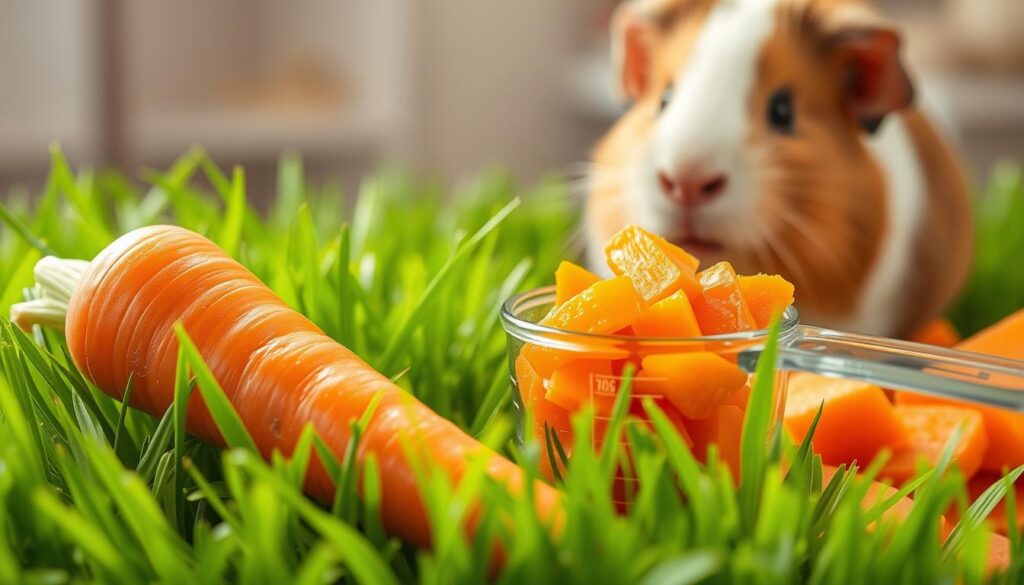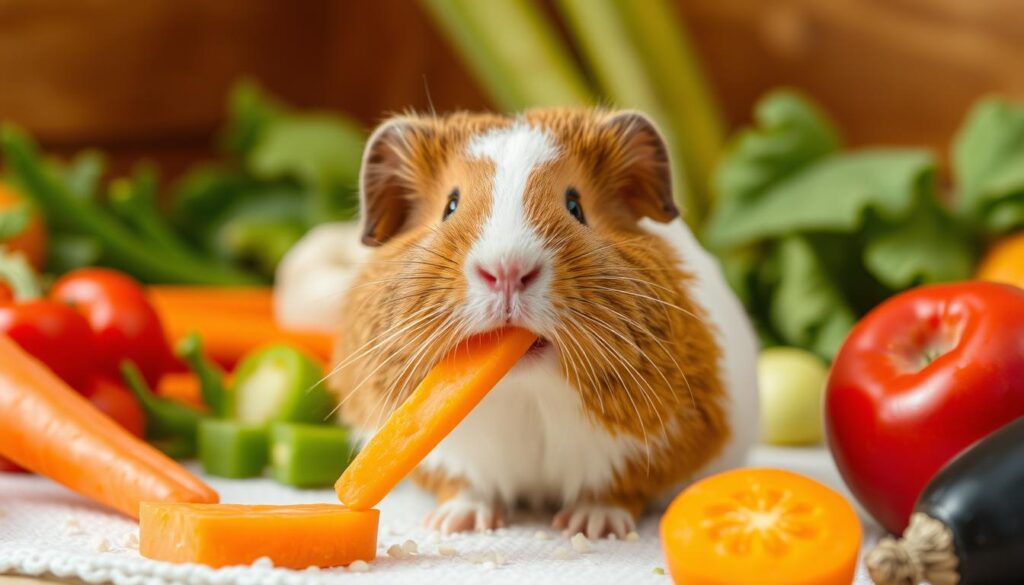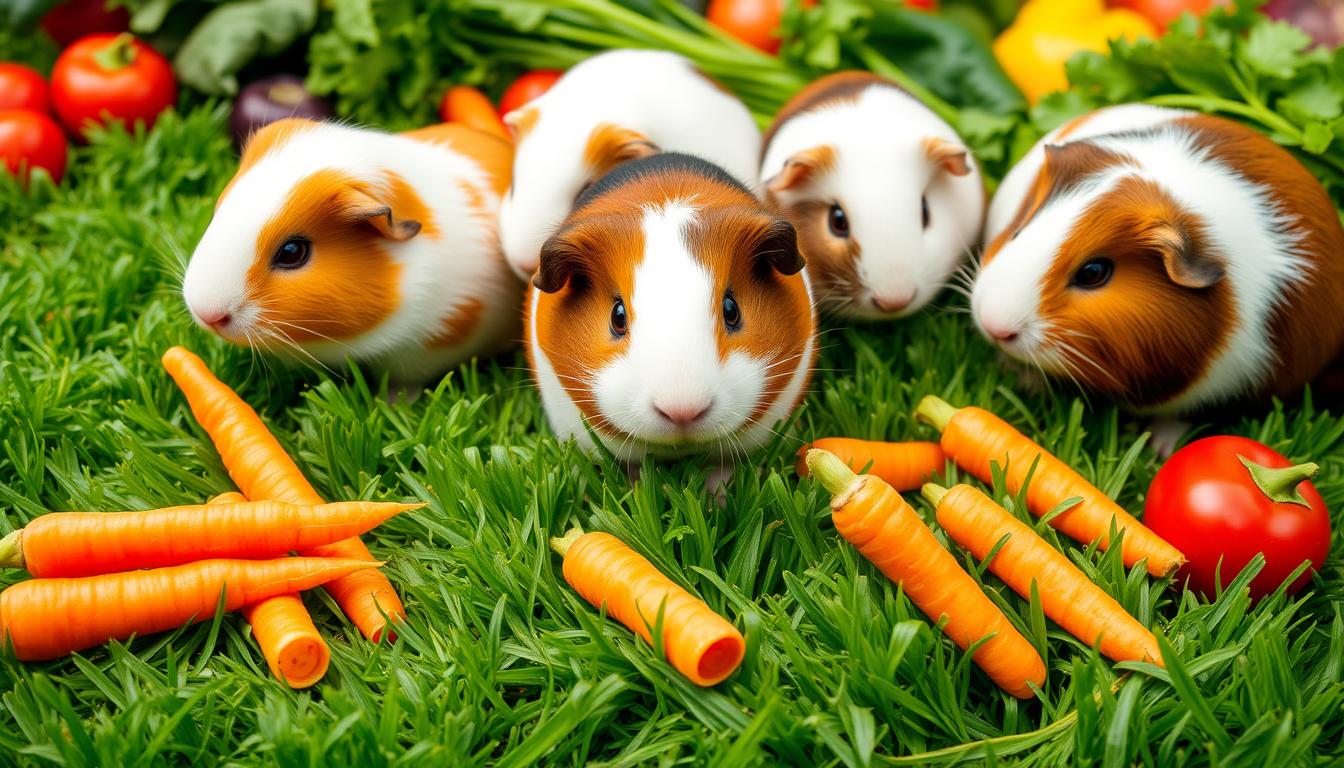As a pet owner, you might wonder if carrots are safe for your guinea pig. The answer is yes, but it’s important to know how to feed them right. This guide will cover the role of carrots in a guinea pig’s diet, their benefits, and how to introduce them.
Carrots are seen as a healthy snack for guinea pigs, but there’s more to it. It’s key to control portions and understand your guinea pig’s diet needs. Let’s explore guinea pig nutrition and see how carrots can be a great addition to their meals.
Table of Contents
Understanding Guinea Pig Diet Basics
As guinea pig owners, knowing what your pets need is key. They have special dietary needs to stay healthy. Let’s explore what’s important for their daily nutrition.
Essential Components of Daily Nutrition
A guinea pig’s diet should be mostly hay and pellets, 80-90%. The rest, 10-20%, should be fresh veggies. This mix ensures they get all the nutrients they need, including vitamin C.
Role of Fresh Vegetables in Diet
Fresh veggies are vital for guinea pigs. They offer vitamins, minerals, and fiber. Give them one cup of veggies daily. Carrots, kale, cucumber, and red bell pepper are good choices.
Importance of Hay and Pellets
Hay is the main part of a guinea pig’s diet, making up 80%. It keeps their teeth healthy and aids digestion. A small amount of pellets, about two tablespoons a day, adds extra nutrients.
Knowing the basics of a healthy guinea pig diet is crucial. A balanced diet, with hay, pellets, and a variety of vegetables for guinea pigs, is essential for their health.
Can Guinea Pigs Eat Carrots
Yes, guinea pigs can safely eat carrots as an occasional treat. Carrots are rich in vitamins and minerals, especially vitamin C. This vitamin is key for guinea pigs. But, carrots are high in sugar, so they shouldn’t be a daily food.
Guinea pigs need a diet rich in fiber, with hay being at least 75% of their food. Carrots add valuable nutrients but should not be the main part of their meals.
Nutritional Profile of Carrots
Carrots are packed with vitamin C, with 3.6 mg per 100 grams. Guinea pigs need 10-50 mg of vitamin C daily. Carrots also have important minerals like calcium and phosphorus. But, the calcium to phosphorus ratio in carrots is not ideal for guinea pigs.
Carrots are also a good source of dietary fiber, which is vital for guinea pigs’ digestive health. But, their high sugar content can cause digestive problems if eaten too much.
Serving Size and Frequency
The recommended serving size for carrots is about 40 grams per day. This can be divided into smaller portions for occasional treats. Guinea pigs should not have more than one cup of fresh fruits and vegetables daily, with carrots being just a part of that.
Introduce new foods like carrots slowly and in small amounts. This helps ensure your guinea pig’s digestive system can handle them without problems.
By giving carrots in moderation and as part of a balanced diet, you can offer your guinea pig a nutritious treat. This helps keep their health and well-being a top priority.
Nutritional Benefits of Carrots for Guinea Pigs
Carrots are great for guinea pigs. They are full of nutrients that help keep these pets healthy and happy.
Vitamin C Content and Its Importance
Carrots are packed with vitamin C, which is key for guinea pigs. They can’t make vitamin C on their own. Carrots have 6mg of vitamin C per 100g. This helps meet their daily need of 10-50mg.
Essential Minerals and Fiber
Carrots also have important minerals. They have 33mg of calcium and 320mg of potassium per 100g. These help with strong bones and muscles. Plus, they have 2.8g of fiber per 100g. Fiber is good for a guinea pig’s digestive health.
Hydration Benefits
Carrots help with guinea pigs’ hydration. They are 88.3% water. Drinking enough water is key for many body functions, like absorbing nutrients and getting rid of waste.
Adding carrots to a guinea pig’s diet is a smart move. It ensures they get the nutrients they need to stay healthy and happy.
| Nutrient | Amount per 100g of Carrots |
|---|---|
| Vitamin C | 6mg |
| Calcium | 33mg |
| Potassium | 320mg |
| Fiber | 2.8g |
| Water | 88.3% |
Safe Serving Sizes and Frequency
Feeding guinea pigs requires careful attention to the right carrot serving size. Carrots can be a tasty treat for them, but only in small amounts. A good rule is to give them 1/4 cup or a small carrot once a week.
Carrots should not be the main part of their diet. Instead, they should have about one cup of fresh veggies every day. This mix helps them get all the nutrients they need.
| Vegetable | Serving Size | Frequency |
|---|---|---|
| Carrots | 1/4 cup or 1 small carrot | Once a week |
| Leafy Greens | 1/2 cup | Daily |
| Bell Peppers | 1/8 pepper | 2-3 times per week |
| Cucumber | 1 slice | 2-3 times per week |
When adding new veggies, do it slowly to avoid upset stomachs. Start with a little and watch how they react. Then, you can gradually increase the amount or how often you give it to them.

Potential Risks of Feeding Carrots
Carrots are usually safe for guinea pigs, but too much can be a problem. It’s important to know the risks and watch how much they eat.
Sugar Content Concerns
Carrots have a lot of natural sugars, about 3.6 grams per 100 grams. Too many carrots can make guinea pigs gain weight, upset their blood sugar, and even lead to diabetes. So, it’s key to not overdo it with the carrots and think about their sugar when planning meals.
Digestive Issues to Watch For
- Too many carrots can cause bloating, constipation, or diarrhea in guinea pigs.
- The high fiber in carrots can be hard for some guinea pigs to digest, causing discomfort and blockages.
- Slowly introducing new foods like carrots and watching how your guinea pig reacts is crucial to their digestive health.
Signs of Overfeeding
- Changes in stool consistency: Watch for any changes in your guinea pig’s bowel movements, as they can signal digestive problems.
- Bloating or unusual behavior: Look out for signs of discomfort, like bloating, lethargy, or less activity, which might mean they’re having trouble digesting the carrots.
- If you see any concerning changes in your guinea pig’s health or behavior, stop giving them carrots and talk to your vet.
Keeping a balanced diet with the right amounts of hay, pellets, and fresh veggies is essential for your guinea pig’s health. Always introduce new foods slowly and watch for any reactions to keep them safe.
Preparing Carrots for Your Guinea Pig
Feeding carrots to your guinea pig needs careful preparation. Always give them raw carrots. This is because cooked or canned carrots can have harmful additives and lose nutrients.
Start by washing the carrots well to get rid of dirt and chemicals. Then, cut them into small pieces to avoid choking. The best size is about 1-inch long or smaller, depending on your guinea pig’s size.
- Wash carrots thoroughly to remove dirt and pesticides
- Cut carrots into 1-inch or smaller pieces to prevent choking
- Never feed canned or cooked carrots to your guinea pig
Don’t give your guinea pig canned or cooked carrots. These can harm their health. Always give them fresh, raw carrots for the best nutrition.
| Nutrient | Amount in 100g Carrots | Daily Requirement for Guinea Pigs |
|---|---|---|
| Vitamin C | 3.6 mg | 10-50 mg |
| Calcium to Phosphorus Ratio | 0.6:1 | Ideal ratio is 1:1 to 2:1 |
By following these steps, you can make sure your guinea pig gets the good from carrots. But, remember, a varied and balanced diet is key for their health.

Carrot Tops and Leaves: Are They Safe?
As guinea pig owners, you might wonder if carrot tops are safe for your pets. The good news is that they are safe and can be nutritious for guinea pigs. But, it’s key to know how to add them to your pet’s diet correctly.
Nutritional Value of Carrot Greens
Carrot tops are packed with vitamins and minerals like vitamin C, calcium, and iron. They also have dietary fiber, which is great for a guinea pig’s digestive health. Plus, they have oxalates that help keep calcium levels in check.
Serving Guidelines for Tops
- Feed carrot tops in small amounts, as part of a varied, balanced diet.
- Offer carrot tops a few times per month, rather than as a daily staple.
- Monitor your guinea pig’s response to carrot tops, as the high calcium content may contribute to the formation of bladder stones if fed excessively.
- Ensure that carrot tops make up no more than 10% of your guinea pig‘s total daily vegetable intake.
- Wash the carrot tops thoroughly to remove any pesticides or dirt before serving.
By following these guidelines, you can safely and responsibly add carrot tops to your guinea pig’s diet. This will give them a variety of fresh, healthy greens to enjoy.
Combining Carrots with Other Vegetables
Carrots are great for guinea pigs, but they shouldn’t be the only veggie. A mix of veggies is key for a balanced diet. This mix gives your guinea pig all the nutrients they need.
Some great veggies to add to carrots include:
- Bell peppers (red, yellow, or orange)
- Cucumber
- Leafy greens like spinach, kale, and romaine lettuce
- Broccoli
- Zucchini
Offering a variety of colorful veggies is good for your guinea pig. It makes sure they get a balanced guinea pig diet. Give them about 1 cup of fresh veggies for every pound of their body weight each day. Carrots should only be a small part of this.
| Vegetable | Nutritional Benefits |
|---|---|
| Carrots | High in Vitamin A, Fiber, Vitamin C |
| Bell Peppers | High in Vitamin C, Vitamin A, Fiber |
| Cucumber | High in Vitamin K, Vitamin C, Hydration |
| Leafy Greens | High in Vitamin A, Vitamin K, Calcium, Iron |
| Broccoli | High in Vitamin C, Fiber, Vitamin K |
| Zucchini | High in Vitamin C, Manganese, Fiber |
Adding different veggies to your guinea pig’s diet is important. It helps them get all the nutrients they need. Try different mixes to find the best vegetable variety for guinea pigs and a balanced guinea pig diet.
Special Considerations for Young or Senior Guinea Pigs
Feeding carrots to young and senior guinea pigs requires special care. Young ones need more calcium for growth. Older guinea pigs might prefer softer foods due to dental issues or chewing problems.
It’s important to introduce carrots slowly and in small amounts. Watch how your pet reacts to the new food. Always talk to your vet for advice on what’s best for your guinea pig’s age and health.
Every guinea pig is different, especially when it comes to age. By considering their needs, you can make sure they get the most from carrots. This way, they stay healthy and happy.

